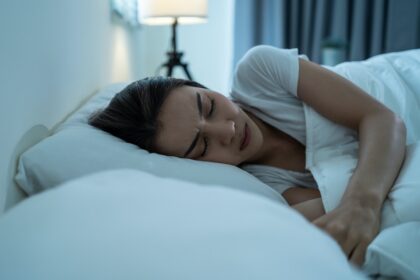How to improve your sleep environment
Do you struggle to fall and stay asleep? Find out how you can improve your sleep environment to help beat insomnia.
Whether you suffer from insomnia, struggle with your sleep quality, or simply want to make sure you’re doing everything you can to get the best rest, it’s important to think about how your sleep environment may be affecting your ability to recharge during the night.
Everything from the temperature of your room to how messy it is can keep you awake and have a knock-on effect on your energy levels the next day, but that also means that there are plenty of things you can do to your sleep environment to make it work for you.
As a result sleep experts Coast Road Furniture have researched the optimal sleep environment looking at factors such as temperature, the perfect colour and atmosphere.
Cleanliness
Everybody feels better when they have clean bedsheets, and ensuring your bed is hygienic can help you sleep better too. You should wash your sheets and pillowcases once a week, your duvet cover once every two to three weeks, and any blankets or comforters you have on your bed every two to three months.
Your inner duvet and pillows can be washed every six months, just make sure you read their labels to see whether they can be popped in the washing machine or need to be washed by hand. Your mattress should be cleaned every six months and replaced every six to eight years.
It’s not just your bed that needs cleaning but your bedroom too. Your sleep environment is very important and can have a huge impact on the quality of your rest – in fact, a messy bedroom can keep you awake and make falling asleep much more difficult. This is because clutter can affect our anxiety levels, sleep, and ability to focus, so make sure you keep on top of your bedroom chores.
Temperature
The best bedroom temperature for encouraging sleep is usually 18.3°C, or anywhere between 15.6 to 19.4°C depending on your preference. However, it can be difficult to regulate the temperature of your bedroom, particularly in summer and winter.
When it’s cold, switch to a duvet with a heavier tog or add extra blankets to your bed to keep warm — turning up the heat will effectively raise the temperature, but it can dry the air out and cause sinus issues. Research suggests that the best relative humidity for sleeping is between 40% and 60%.
Similarly, in summer, opening your windows is preferable to using a fan or air conditioning unit for air quality and humidity. But, if you suffer from hay fever or allergies and find keeping your windows open makes this worse, you might prefer to have them closed.
Atmosphere
Another important element of your sleep environment is the atmosphere, including how dark and quiet your bedroom is.
Darkness
It’s crucial you have sufficient darkness when sleeping, as light exposure during sleep can suppress melatonin and impair cardiometabolic function.
Blackout curtains and blinds can be very helpful, particularly in summer when the mornings and evenings are lighter – just make sure you open them during the day to support your circadian rhythm and melatonin production. A sleep mask may also be effective, especially if you travel a lot and can’t control the darkness of your room.
Noise
Even small sounds and background noise can wake you up and disturb your sleep. One way to reduce noise is to include lots of soft surfaces in your bedroom. Soft furnishings like rugs and carpeting can absorb noise, and even houseplants can muffle it to create a quieter environment.
Double glazed windows are capable of reducing sound levels by as much as 31 decibels, so they can prevent disturbances from outside such as busy roads or city centre noise. Earplugs can also be used to block out noise, and many are designed to be comfortable enough to use when lying down.
Scent
According to aromatherapy, the way your bedroom smells may have an impact on your quality of rest so a scent diffuser may be useful if you struggle to drift off at night. Some of the best scents for encouraging sleep include:
- Rose
- Lavender
- Chamomile
- Jasmine
- Cedar
- Ylang-ylang
Colour
Did you know that the colour you paint your room can affect your sleep? A survey by Travelodge looked at 2,000 British homes and found that purple, brown, and grey bedrooms were the least sleep-inducing, while blue came out as a clear winner, followed by yellow and then green.
In fact, 58% of Britons with a blue wall colour reported waking up feeling happy and refreshed. The colour blue is said to be associated with calming and soothing feelings, which help to prevent nightmares.
Sleep habits and routine
Between seven and nine hours is the optimum sleep duration for adults and young adults, so most people aim for around eight hours of sleep a night. This amount increases the younger the person is and decreases as we age, so children and teenagers sleep for much longer than mature adults and the elderly for much less.
However, it’s possible that having a fixed sleep schedule, such as going to bed the same time each night, is more beneficial to your health than getting enough sleep.
Winding down before bed is important too. Stress can cause insomnia, and reading is one of the best ways to reduce feelings of stress before you try to go to sleep. A study in the Telegraph found that reading before bed was more effective than listening to music (61%), drinking tea or coffee (54%), and taking a walk (42%), and it only took six minutes of reading for participants’ stress levels to be reduced.
As difficult as it can be to put your phone, tablet, or laptop away, it’s best to have a ‘no devices before bed’ rule. Using a media device too close to bedtime can cause poor sleep quality, inadequate sleep quantity, and excessive daytime sleepiness.
Part of this is due to blue light. All types of visible light can affect your circadian rhythm, but blue light has the largest impact and exposure to blue light in the hours leading up to bedtime can hinder sleep.










